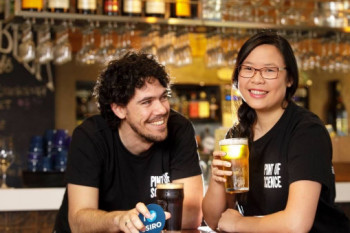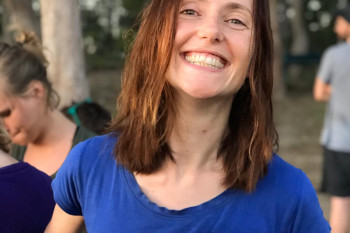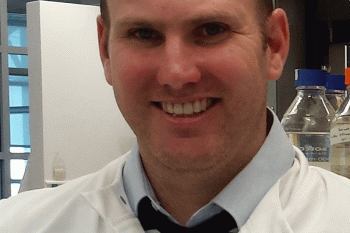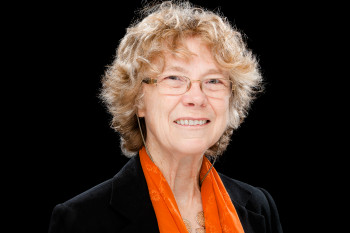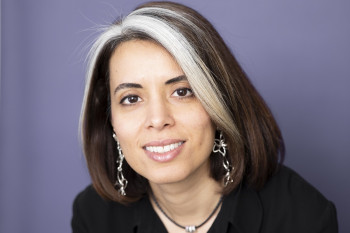© Pint of Science, 2025. All rights reserved.
Forming Life
Luke Steller with Dr Larissa Fedunik
What are the origins of life? Do aliens exist? To find out, we caught up Luke Steller, PhD candidate at the Australian Centre for Astrobiology at UNSW.
Luke's research not only helps us understand where we (and all life) came from on Earth, but helps us figure out if we are alone in the universe. He’s also passionate about science outreach, and is the co-founder and director of learning platform Praxical.
Over a spicy chai at Cafe Ella in Darlington, we chatted about everything from Luke's adventures exploring stromatolites in the Pilbara, to hitting up No Lights No Lycra with his PhD supervisor!
~~
Luke Steller is a science communicator and PhD student at the Australian Centre for Astrobiology, UNSW. His research focuses on understanding how life formed on Earth, through studying ancient and modern hot springs.
You can find out more about Luke at his website, or following him on Twitter (@steller_luke).
~~
Transcript
Luke Steller: Astrobiology is all about trying to figure out how did we come here on Planet Earth. How does all life begin here, and then how can we use that information to figure out if we're alone in the Universe. Are there other planets out there that may have life forms, what kind of life would that be, what would it look like...
Dr Larissa Fedunik: Hi everyone and welcome to Mug of Science! Mug's a new initiative for Pint of Science for 2021 where we head to local cafes and catch up with a scientist over a morning cuppa. I'm Larissa Fedunik and today I'm at the lovely Cafe Ella, which is in the Redfern Darlington area in Sydney and I'm fortunate enough to be joined by Luke Steller, who works at the Australian Centre for Astrobiology at UNSW. Thanks so much for joining us, Luke.
Luke: Thank you so much for having me, yeah. It's such a great experience to be here. Thank you.
Larissa: So today we're going to be having you know, a casual chat about what makes Luke tick and his his journey in science and also potentially the origins of life on Earth, because that's what Luke researches. But before we get into that, most important question for the morning is what is in your cup?
Luke: So I'm drinking this morning a masala chai, so it's like a black tea with heaps of milk, and then lots of spices in there, so you've got some ginger cardamom, a bit of nutmeg, some star anise, I find that coffee itself doesn't really get me going, so I need all these spices as well to really wake me up in the morning.
Larissa: Yeah nice, and it's a bit different from the conventional flat white or long black!
Luke: Yeah, I try to keep it interesting.
Larissa: So before we get into the origins of the Universe and so on, could you tell me a bit about you, Luke, as a person. What are you into outside of work?
Luke: Yeah definitely, so I think a lot of my friends would describe me as a people person. I love connecting with everyone I meet and trying to understand a bit more about them and to know more about their story. So socially I'm very talkative, I'm always trying to know what people are into, what they're doing, and then I think in work as well, I'm quite like that, I always want to know what people's experiences are, how their views of science have changed from what they've, you know, come across in their life and I love having discussions like that. Beyond that, I'm really into basket weaving, so I go out into the bush a lot and collect some grasses and weave up some baskets every now and then. I also love dancing which is a very big part of my life.
Larissa: Nice, do the baskets end up in your house, like for pot plants?
Luke: Way too many of them, yeah, I've got a growing collection of baskets. The beautiful thing about basket making is because it's all organic, it all eventually goes back to the earth. You know, so you make a basket and, depending how good it is, you know, it may last for a few weeks or you might take it to the beach once it gets wet and it starts falling apart and then you can just bury it again and it just goes back into the natural cycle of organic matter.
Larissa: Love that it's a really nice sustainable hobby, yeah. And what sort of dancing do you really do?
Luke: So I would describe it as just like, I don't know, letting your body express itself, without any training or thought at all. There's a group in Newtown called 'No Lights No Lycra' and basically they meet up on a Thursday evening and they just go into like a community hall and jump around for an hour and a half with no drinking, minimal lights, you don't have to look what anyone else is doing, and it's just great music and moving your body, so yeah, that's what I try and get up to as much as I can.
Larissa: Do you ever take your colleagues from work to it?
Luke: Sometimes I've invited some, you know, my fellow PhD students along, I've also invited my supervisor to a contemporary dance performance one time, which he loved, which was great. I was very nervous about that but that was really nice, so yeah I'm slowly trying to get them involved, yeah.
Larissa: Okay cool, so let's get into the science, so you're a PhD candidate at UNSW and
in your third year of your PhD, right? So tell us a bit about what an astrobiologist does.
Luke: Yeah so it's a very broad term and people usually get me confused with an astrologist, and they ask me what my star sign is and you know, is it Taurus season yet, all that kind of stuff, but really astrobiology is all about trying to figure out how did we come here on Planet Earth, how does all life begin here and then how can we use that information to figure out if we're alone in the Universe. Are there other planets out there and if they have life forms, what kind of life would that be, what would it look like, and could we potentially communicate with it, how would that work as well, so it's a very big field it's very interdisciplinary, everyone comes at it from different perspectives, they may be, you know, astronomers or physicists or biologists or geologists or philosophers or, you know, lawyers who want to understand the ethics of going to other planets and contaminating or colonising them, so it's a whole big bunch of people getting together trying to understand this huge question really, which is are we alone.
Larissa: Wow, that's great. So in this huge multidisciplinary field, how did you come into it, so what's your background?
Luke: So I was kind of reluctantly drawn into it. So I started off as an environmental chemist, and I was really passionate about mainly around pollution and you know human impacts in the environment, so I studied you know groundwater contamination, I studied you know soil contamination, how you can purify water but then in my third year, I was offered the opportunity to go out into the Pilbara in Western Australia. So for those of you who don't know, the Pilbara has some of the oldest fossils in the world out there. So they're three and a half billion years old and scientists from all over the world come and study them because it helps us understand where life came from here on Earth but also, if you go to a place like Mars which is also very rocky, could you find fossils like that on Mars as well, so long story short, there was an amazing Masters student out there called Sahan who didn't have his driver's license, so he needed a chauffeur. He just needed someone who could drive him around in a big old beaten up four-wheel drive for a few weeks in the desert to take them to all these different rock outcrops to understand how they formed. So a supervisor I knew at uni said, Luke you like getting out in the bush, you like camping, do you want an all-expenses-paid trip out to the Pilbara to drive around? And ever since then I've been in love with this idea of trying to understand our history on Earth and use that to understand if we're alone in the Universe.
So I did my Honours in astrobiology. I went up to a hot spring in the northern Himalayas, up in Ladakh. I was trying to figure out how they formed and what they could tell us about life maybe forming or living in hot springs on Earth as well as on other planets. I had a bit of a break after uni, went and lived out in Alice Springs for a while, which was a lot of fun and now I'm back doing my PhD, still trying to look in hot springs and figure out how life formed in there. so yeah.
Larissa: Great, cool, so you're looking at sort of several environments that life on Earth originated. So these hot springs, are you still looking at these, is it stromatolites, in the Pilbara?
Luke: Yeah, so part of my research is still in the Pilbara. So these fossils out there, they're not where we think life form, because they're a bit too young. They're around three and a half billion years old, which sounds incredibly old but we think life might have started around four billion years, so that's half a billion years before, because the fossils we have out there they're incredibly sophisticated, you know, they're photosynthesising, they're growing in colonies, they're making wacky shapes and processing different elements and minerals...
So we think that life there was really kind of stuck in the ground, it was really going, so we want to go even further back to understand, what were the first steps that led to that early life in these stromatolites in the Pilbara. So a lot of the work I do is looking at hot springs, because we think that life may have formed in a hot spring. Yeah, so I go to fossilized hot springs, like ancient hot springs that stopped working long long ago, but you can still see stuff kind of stuck in the mud and dried out in there, and I also go to, you know, active hot springs, so up to Ladakh in India to look at the hot springs there, I went across to New Zealand and Japan and we're trying to understand what chemical processes happen in hot springs and whether they're the right conditions for life to form.
Larissa: Yeah, wow, it sounds like you've had some amazing experiences out in the field. Is that one of your favorite parts of it, the field work?
Luke: Oh, definitely. Yeah, I think that was definitely my draw card into this field. I was, as I said, a bit reluctant to go into it but my supervisor bribed me with trips to India and trips into the Pilbara to kind of get me on board, but now I'm hooked. So I love the lab work as well and it's really exciting because I get to bring the field into the lab. I go out and collect samples from hot springs or from muds or sediments and I bring them into their lab and try to see if I can get primitive forms of life to grow in these environments. So rather than doing purely you know clean sterile stuff in the lab, I'm actually trying to see the messy nature of, you know, the world around us that life would have formed in, can we bring that into the lab and can that shape our experiments.
Larissa: So what drew you to science originally? Was there someone that inspired you to get into it, or is it something that sort of happened organically?
Luke: Yeah, so I had two, I guess, big role models in my life. My mum, she's a social worker, but she does a lot of research as well and even though the research she does isn't really in the field that I'm in, she's really studying how mental meditation and mindfulness can help all the people in palliative care, you know, become more comfortable with the idea of, you know, dying and being more at ease of that kind of stuff.
I always saw my mum working really hard producing great research and helping people through that, so that was really inspiring as a kid. And I guess my grandfather as well, he's a physicist and we, you know, didn't connect on a lot of stuff when I was younger because he was this very loving but strict German man and he would connect with me through science. You know, he'd come around and look at my science homework and tutor me stuff and always tell these amazing long-winded stories about the scientists he met who made up the equations I'm studying in physics, and all this kind of stuff, so we really connected through that and that really, yeah I guess, showed me that you can, no matter what you're doing within science, you're always exploring something new and I think that really appealed to me. So yeah, I guess, that's where I got into science. I'm also very passionate about the environment and about getting out into the environment and learning from it, you know, it's this really beautiful, I guess, reciprocal realisation, especially when you go into the field because you can, you know, you're trying to learn stuff on the environment, you're trying to understand it, but it's teaching you stuff as well, you know it's changing the way you may see a rock outcrop, because you see it in day and night, or different shades of light would reveal new things to you, or hot springs are changing all the time so you really have to be patient and sit there and look at these things, slowly bubbling and working away, and I think that's a really good lesson for life. It's just to sit and to watch and to listen and that's how you learn. So yeah, I really enjoy those aspects of science as well.
Larissa: Yeah, great, so speaking of learning so Luke is also the co-founder and director of a learning platform called Praxical. So could you tell us a bit about that?
Luke: Yeah, so back during peak COVID last year, myself and a fellow PhD student, Bonnie Teece, who's doing amazing work in astrobiology as well, we got together and we were just trying to figure out how can we still engage students or people who aren't interested really in science online. You know everyone had a shift online, I'm sure everyone experienced online learning and Zoom meetings and all those annoying things. Still, like how can we still get people to actively experience science while doing it online? So we partnered up for National Science Week last year with ANSTO, which is the nuclear reactor facility in south Sydney, and like national parks and researchers at University of New South Wales and we asked them to distill what are they trying to teach, what are they trying to you know, the main message they want people to understand, but how can people learn that from their own experience, rather than just throwing a whole bunch of facts at them?
What experiences they have, then what can they do online, which is really difficult, because how do you experience stuff online when it's you know science and in person, it's all around you, you know, physical sensations, experience and that stuff. So we did a whole lot of stuff where people were using GIS, which are online mapping tools to understand how birds were, you know, Regent Honeyeaters, this really beautiful endangered bird in the Hunter region, how were they being monitored and managed, but they could use the maps themselves to understand how they formed. Or they're plotting pollution themselves in Excel from a whole range of different sites around Australia and understand how changing weather patterns and fires could affect that pollution. So we really tried to give them that hands-on experience. Since then, when we created Praxical, it's just blossomed into a whole bunch of different stuff. I'm working with contemporary dancers at the moment to try and figure out how we can I guess, explore concepts of science through dance.
I'm working with, you know Indigenous astronomers and other people who have a really strong cultural connection to Australian science, and how can we display that in a new interesting way that may be engaging with people who haven't heard about science or research in the past. I also just started up a science comedy night, which will hopefully get going kind of soon, but we're trying to bridge that gap between you know, science and the creative arts. And I think a big part of it as well is the role of art in science. A lot of the time when people think about, you know, SciArt or STEAM, it's always, you know, how can artists be influenced by science, how can artists you know, use scientific concepts in the artwork, but we wanted to go to other ways as well, we want, how can scientists embrace concepts of art and of performance and of creativity in their research to make their research more richer. So we're trying to explore that two-way stream between science and art.
Larissa: Yeah, nice. Do you think science is creative? Do you think it's a creative field?
Luke: Yeah, I think inherently trying to do something new which science really is, is a creative pursuit. I think that that being said, there's a lot of creative practices that you don't see in science. I think the nature of, you know everything from funding to this mentality that you can't fail, you always have to get those publications out, really limits the ability for people to be creative just for the sake of it, you know, to try something new and to potentially make that mistake, but to keep going anyway, you know. I also see there's a lack of doing stuff just for the joy of it in science, which many people may say that isn't there, but I think
that if you love what you do and you, you know enjoy day to day, you're going to be better at it. So I'd love to see scientists running experiments just because they want to know to answer, but not because it's going to get them that next great publication and win the next grant.
Larissa: Yeah, nice so we've touched on the origins of life, now let's go outward. I have to ask the question on everybody's lips, what is the consensus or your opinion on whether aliens exist?
Luke: It's a really good question and in all honesty science doesn't really know. You know, it's a really hard question to wrap our head around. On one hand we're discovering these extra solar planets, so planets outside our solar system every day and there's more and more coming up and we think now that nearly every star we see in our galaxy at least has at least one planet revolving around it that may be habitable for life, so the idea that the conditions for life are, you know rare in the universe is becoming a lot less solid. We're now realising that everywhere we look there are habitable planets where life may have formed. That being said, where is everyone? You know, if there's billions of planets out there and there's all the right conditions for life to form, why haven't we been visited by E.T. yet? There's a lot of different theories on that. There's a really interesting thing called the Fermi paradox, which is trying to really figure out that question. It's like, if there's so many planets out there, why haven't they come to us, and there's all these different answers to that.
There are questions around, you know, are we a zoo, is our life so primitive and so fascinating to other alien species they put a big kind of national parks bubble all around us and people come here to look at us. They're not allowed to interact with us because they don't want to disturb our fragile little society, which is interesting. There's other things around this concept of a great filter, so that is that maybe life forms readily everywhere in the universe, you know, there's hot springs and deep sea vents and all those kind of things on other planets and life really can easily get going, but maybe there's a point in life's, I guess, evolution that it's really hard for it to get past and that could be maybe the formation of eukaryotes or like multicellular organisms. So maybe there's heaps of, you know, little slimy microbial mats out there going around, but to actually form a big complex life such as ourselves and animals and all these kind of things, maybe that's really tricky to do. The other great filter people talk about is advanced civilisations, maybe once a community of animals or plants or whatever may grow in outer space gets a certain level of intelligence, they quickly kill themselves because they you know, create too much pollution or warfare or stuff like that. And that's not too hard to see because on Earth we've you know, had an Industrial Revolution ~200 years ago and we're already screwing a lot of stuff up, you know, so that's one thing that people think about as well is that maybe we can learn the absence of, you know, life in the Universe is a wake-up call to us to look after ourselves more, so maybe we can get past that great filter and, you know, be one of the first you know, civilisations in the Universe or in our galaxy at least to get past the TV teenage years of our society and become, you know sustainable respectful, resourceful members of the galaxy. So yeah, it's a big question, no one really knows!
Larissa: Just a few heavy topics over a morning cuppa, Mug of Science everyone!
Luke: What more could you want?
Larissa: So thanks so much for your time today, Luke. So we're asking all of our guests to complete this sentence for us, so could you tell us: To me, a scientist is someone who...
Luke: It's a really good question. So to me, a scientist is someone who is constantly in, I guess connection with the natural world around them. So they whether it's studying stem cells in a lab, understanding how people interact with each other, or trying to figure out if there's life on Mars, every scientist that I'm aware of is trying to delve deeper into the natural world and understand a bit about it and even though they may not be aware of it, that's a two-way street, you know, they're trying to take stuff from the world, they're trying to understand what's going on, but hopefully they can make it a better place as well. They can give back to that natural world and help it flourish, survive on this planet. So yeah, to me a scientist is someone who is in a deep, beautiful conversation with the world around them. So yeah.
Larissa: Great answer, thank you! So thanks again Luke and thanks to all our viewers and join us next time for our next episode of Mug of Science! Thank you.
